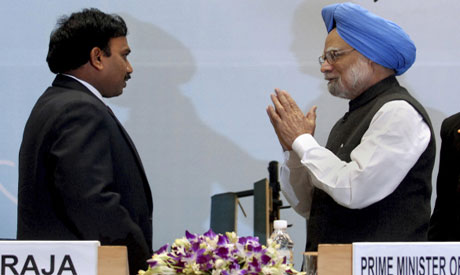
Indian Prime Minister Manmohan Singh, right, greeting then Telecoms Minister Andimuthu Raja in New Delhi, India, Dec. 4, 2009, (AP).
The Congress-led coalition government is not in danger of collapse though because the Dravinda Munnetra Kazhagam party has said it will offer the coalition conditional support after its two cabinet level ministers and four junior ministers quit.
Still, the move will make it more difficult for Prime Minister Manmohan Singh to push through his agenda, including economic reform, because he will have to rely on new groups for political support on different issues.
He faces rising anger over corruption scandals that have tainted the government and stubbornly high food inflation.
"We are going to the prime minister ... and will submit our resignations," said DMK minister M.K.Alagiri. "We will not accept anything that will compromise our self-respect."
The dispute centres on how many seats the DMK and Congress will contest in an election next month in the southern state of Tamil Nadu, the DMK's base. Senior Congress leader Ghulam Nabi Azad told reporters there had been no breakthrough in resolving the dispute.
The news added to investor worries on Monday. Indian shares fell 1.4 percent, led by financials, with the decline compounded by unease over Libyan turmoil and wobbly Asian stocks.
"The DMK's withdrawal is a negative but not a very big one. While investors don't like the uncertainty, they know that the government is not in danger," said Gajendra Nagpal, CEO of Unicon Financial.
"The unrest in the Middle East and rising oil prices are a bigger threat right now."
The DMK has six ministerial positions in the council of ministers, which represents the full range of the federal government.
It holds two positions -- minister of textiles and minister of chemicals and fertilisers -- in the 34-member cabinet.
The coalition has a majority of one with 273 members in the 545-seat lower house of parliament.
The Congress party can seek support from other regional groups to boost its numbers in parliament, as few want to face an election more than three years ahead of schedule.
A political party based in the north has said it would consider supporting the coalition if it was approached.
The withdrawal of the DMK from its ministerial posts though will reinforce the image of a coalition adrift, either unwilling or unable to tackle a culture of corruption that has touched government, industry and even the media, and taken the shine off one of the world's fastest-growing economies.
Singh bowed to demands in February for a parliamentary investigation into a telecoms scandal after months of protests by the opposition stalled the last parliamentary session.
On Monday, Singh appeared before parliament, accepting responsibility for naming a civil servant to the country's top anti-graft watchdog even though the officer was himself facing allegations of wrongdoing. He made similar comments on Friday.
"There has been an error of judgement and I accept full responsibility," he said following the Supreme Court's decision last week cancelling the appointment of the tainted officer.
While the trigger for the break was a seat sharing plan for next month's Tamil Nadu election, political analysts say ties have been strained since the DMK was implicated in the telecoms scandal.
India's state auditor said concessions to run networks in the world's fastest growing mobile phone market were sold at rock-bottom prices by the telecommunications ministry headed by A. Raja, a DMK member.
The auditor said the government lost $39 billion in revenues.
Raja was sacked and is in detention pending formal charges. But there is concern within the party that the federal investigation into the scandal may touch other top leaders of the DMK. The party has denied any wrongdoing.
Analysts say Congress appears to have toughened its stand toward the DMK by refusing to give in to its demands either on seat sharing in the local election or the investigation into the scandal.
Short link: